Understanding Link Relevance in SEO
Jun 12, 2024
Written by Adam Rouillard

Adam, a skilled salesperson here at Vazoola, specializes in link building strategy, anchor text selection, and backlink quality. Originally from Eastham, Massachusetts, Adam transitioned from a career in real estate to join our sales team. Outside of work, he enjoys sailing, spending time at the beach, and exploring local art galleries.

Understanding link relevance is crucial for SEO success.
Backlinks are a significant ranking factor for search engines. However, effective linking involves more than accumulating a high number of backlinks. Link relevance also plays a pivotal role.
That relevance is determined by how closely related the content on the linking website is to the content on your own site.
Search engines prioritize content that is both authoritative and relevant, so niche-relevant backlinks are a powerful asset.
Key Takeaways:
-
Mastering link relevance requires understanding the importance of quality over quantity in backlink strategies.
-
Search-based tactics for evaluating link relevance highlight the use of advanced Google operators and competitor backlink analysis as effective methods to find relevant link opportunities.
-
Building high-quality, relevant backlinks focuses on tactics like guest blogging, creating shareable content, and leveraging social media to acquire valuable backlinks.
-
Measuring and tracking backlink relevancy introduces tools and metrics crucial for assessing the quality and relevance of backlinks, including anchor text analysis, domain/page authority, and topical relevance scores.
-
Link relevancy is not just beneficial but essential for achieving and sustaining SEO effectiveness.
Table of Contents
Should Backlinks Be Niche Relevant?
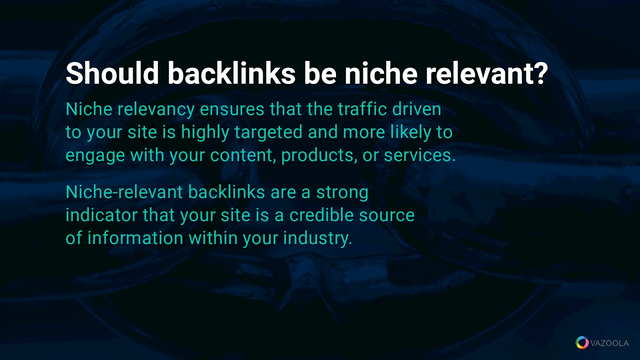
Niche relevancy ensures the traffic driven to your site is highly targeted and more likely to engage with your content, products, or services.
Niche-relevant backlinks also are a strong indicator that your site is a credible source of information within your industry.
From our experience, relevant links contribute to a more sustainable and robust SEO strategy, withstanding algorithmic changes and ranking fluctuations.
What is Relevant Link Building, and Why Does It Matter?
Google and other search engines deploy sophisticated algorithms that evaluate the relevance of a backlink. The algorithms consider several factors, including anchor text, the content surrounding it, and the overarching theme of both the linking and destination websites.
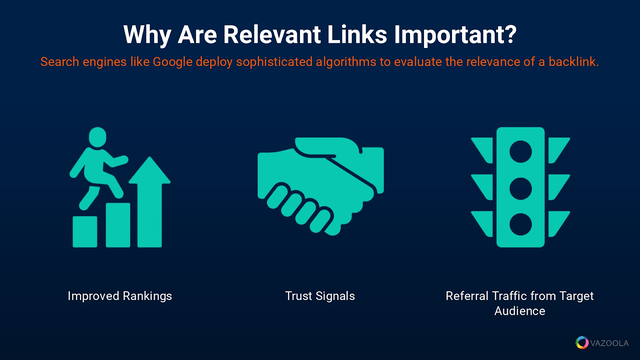
By analyzing these elements, search engines discern the contextual relationship between two sites and the value of a link in terms of relevance.
Backlink relevance offers a variety of advantages. A few benefits of relevant backlinks include:
-
Improved Rankings: Relevant backlinks are viewed favorably by search engines, often leading to higher positions in SERPs.
-
Trust Signals: Links from authoritative and industry-related sites serve as endorsements, enhancing your site's credibility.
-
Referral Traffic from Niche Audience: A link from a relevant source can drive targeted traffic to your site, bringing visitors genuinely interested in what you have to offer.
Just like relevant link building offers plenty of advantages, irrelevant links can spell disaster for a link building campaign. A few risks of irrelevant backlinks include:
-
Potential for Google Penalties: Acquiring backlinks from unrelated or low-quality sites can trigger penalties, negatively impacting your search visibility.
-
Diluted Link Value: Links from irrelevant sources contribute little to no value. They can dilute the potency of your entire link profile.
-
Wasted Effort: Time and resources spent on gaining irrelevant links could be better invested in securing valuable, niche-relevant backlinks.
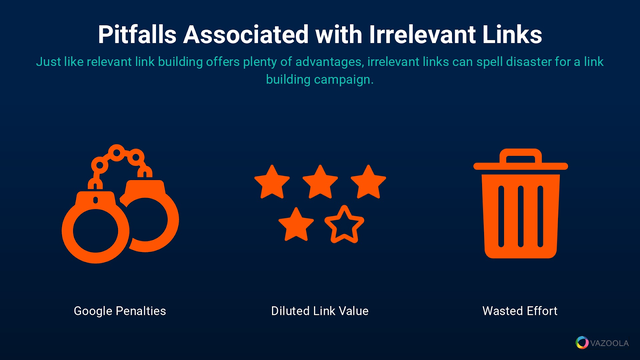
What Is a Relevant Hyperlink (Or Not)?
In the world of SEO, not just any hyperlink will do.
At Vazoola, we've learned through extensive experience that relevant link building focuses on acquiring links that are not only authoritative but also closely aligned with your site's content and purpose, ensuring that each link adds real value to your SEO efforts.
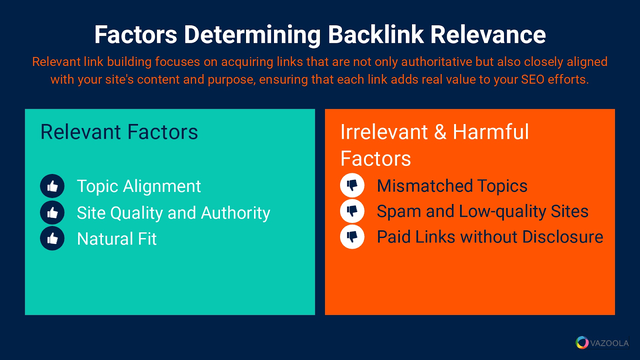
Relevant Factors
Relevant links can be identified by a few common factors, including:
-
Topic Alignment: The link comes from a website within your niche or industry, enhancing thematic consistency across linked content.
-
Site Quality and Authority: Links from reputable and authoritative sites carry more weight and contribute significantly to your site's credibility.
-
Natural Fit: Placement of links in the main content is preferred over those tucked away in footers or sidebars, signaling genuine endorsement.
Irrelevant and Harmful Factors
A strategic approach to link relevancy, however, requires more than identifying relevant link opportunities You also should understand what link factors are irrelevant or harmful to an SEO campaign, including:
-
Mismatched Topics: A tech site linking to a baking recipe offers little to no contextual relevance, diluting the link's potential SEO value.
-
Spam and Low-Quality Sites: Backlinks from sites known for thin content or manipulative tactics can harm your site's reputation and SEO performance.
-
Paid Links Without Proper Disclosure: Engaging in this practice violates search engine guidelines and can lead to penalties, undermining trust and integrity.
How to Find Relevant Backlinks
Securing backlinks that resonate with your site's theme and audience is a cornerstone for climbing the SEO ladder.
Here at Vazoola, we've honed strategies that not only identify but also leverage these golden opportunities for our clients, ensuring every link adds value and drives performance.
Search Based Tactics
When it comes to refining your link-building strategy, searching with precision can make all the difference.
At Vazoola, we leverage a variety of search-based tactics to ensure we're connecting with sites that not only offer high-quality backlinks but also are highly relevant to our clients' niches. Here's how we do it:
-
Advanced Google Operators: These search shortcuts, such as "intitle:" and "site:", are valuable for quickly filtering through the vast web to find niche-specific sites.
By specifying keywords within titles or searching within a particular site, you can efficiently uncover potential backlinks that are contextually aligned with your content.
-
Competitor Backlink Analysis: Competitor backlink analysis requires specialized tools that peek into competitors’ backlink profiles.
Tools like Ahrefs, SEMrush, Moz's Link Explorer, Majestic, and BuzzSumo help you see not just who's linking to your competitors, but also the quality and relevance of those links.
Pro Tips:
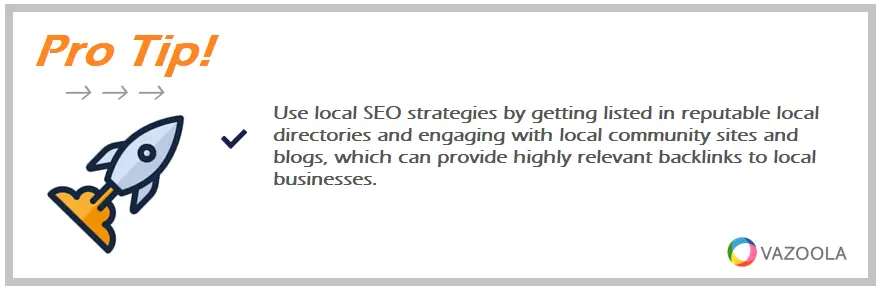
Use local SEO strategies by getting listed in reputable local directories and engaging with local community sites and blogs, which can provide highly relevant backlinks to local businesses.
Assessment of a Site's Relevance
Identifying a potentially valuable backlink source is just the beginning.
Assessing its relevance to your site's content and mission is crucial for ensuring that each backlink contributes positively to your SEO objectives.
How do you assess a website’s relevance to your own content? Consider the following:
-
Topical Content and Authority: Evaluate whether the site regularly publishes content related to your niche, and if its information is considered reliable and authoritative.
-
Domain-Level vs Page-Level Relevance: Determine if the entire site's theme aligns with yours or if only a specific page or category is pertinent.
Pro Tips:
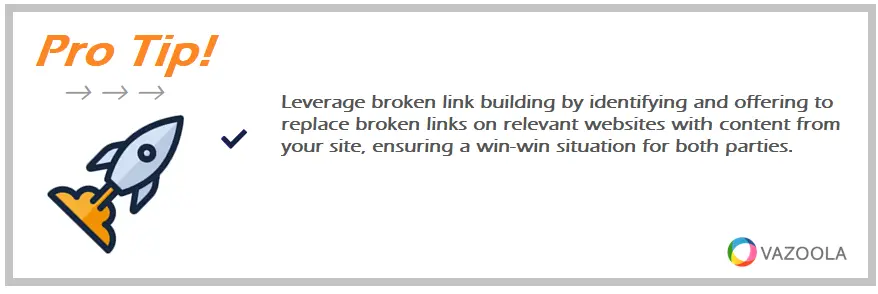
Leverage broken link building by identifying and offering to replace broken links on relevant websites with content from your site, ensuring a win-win situation for both parties.
How to Build Relevant Backlinks
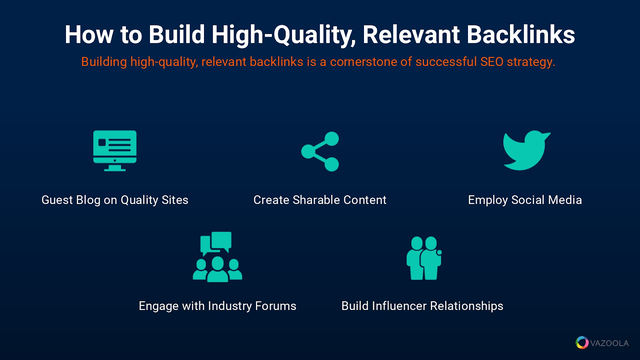
At Vazoola, we understand building high-quality, relevant backlinks requires more than just acquiring any link; it's about finding links that add value and relevance to your website.
Here are five tactics we recommend for building relevant backlinks that truly make a difference:
-
Guest Blogging on Reputable Sites: Write and publish articles on well-regarded sites within your industry to gain valuable backlinks and exposure.
-
Creating Shareable Content: Develop content that is informative, engaging, and valuable, encouraging others to link back to it naturally.
-
Utilizing Social Media Platforms: Promote your content on social media to increase visibility and encourage shares and links from various sources.
-
Participating in Industry Forums and Discussions: Engage with your community by contributing valuable insights, which can lead to natural backlink opportunities.
-
Building Relationships with Industry Influencers: Collaborate with influencers who can provide backlinks through their platforms, enhancing your site’s reach and credibility.
For more insights and guidance on crafting a robust link-building strategy that prioritizes relevance and quality, explore Vazoola's comprehensive tools and expertise, designed to propel your link-building efforts to new heights.
Pro Tips:
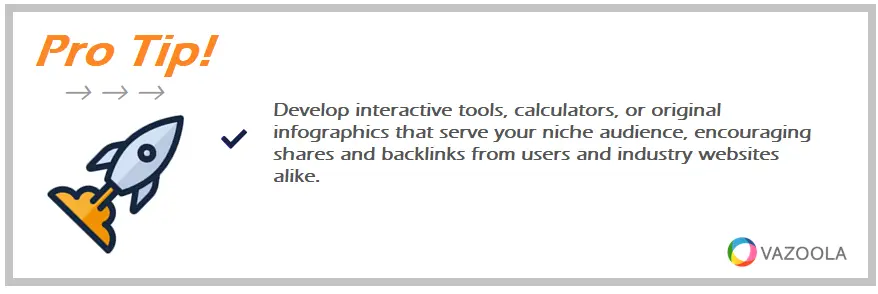
Develop interactive tools, calculators, or original infographics that serve your niche audience, encouraging shares and backlinks from users and industry websites alike.
Measuring and Tracking Backlink Relevancy
Measuring and tracking the relevancy of your backlinks is crucial for refining and optimizing your SEO strategy.
At Vazoola, we emphasize the importance of not just collecting backlinks but ensuring they are of high relevance and quality.
Backlink Analysis Tools
To effectively measure and track backlink relevancy, powerful analysis tools are essential.
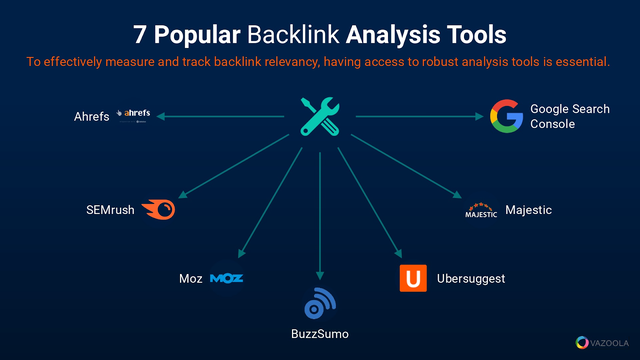
Such tools not only help you understand the quality of your backlinks but also offer insights into potential areas for improvement.
Here are seven popular services that we recommend:
-
Ahrefs: The Ahrefs platform offers comprehensive backlink analysis, allowing you to monitor the quality and relevance of your link profile.
-
SEMrush: The SEMrush service provides detailed insights into your backlinks, including the topical authority of linking domains and the context of backlinks.
-
Moz: Known for its Domain Authority metric, Moz helps evaluate the strength and potential impact of your backlinks.
-
Majestic: Majestic specializes in backlink analysis, offering unique metrics like Trust Flow and Citation Flow to assess link quality.
-
BuzzSumo: The Buzzsumo platform allows you to analyze the most shared content and the backlinks pointing to that content, highlighting opportunities for relevant link building.
-
Ubersuggest: Ubersuggest offers a free tool for backlink analysis, giving insights into the strategies of competitors and potential link-building opportunities.
-
Google Search Console: The search giant provides a direct look into how Google views your backlink profile, offering invaluable insights for free.
Metrics to Watch
Specific metrics provide critical insights that can guide your relevant backlinking strategy and adjustments.
Here are the key metrics to keep an eye on:
-
Anchor Text Analysis: The keywords used in anchor text give clues about the relevance of backlinks to your content.
-
Domain/Page Authority: Links from high-quality sites boost your site’s authority and search engine ranking more effectively.
-
Topical Relevance Scores: Some tools attempt to categorize websites and assess how closely related a linking site’s content is to your own.
Know the Value of Niche Relevant Backlinks
It's clear that niche-relevant backlinks are not just beneficial but essential for the long-term success of your SEO efforts.
Relevant backlinks serve as strong indicators to search engines that your content is not only valuable but also perfectly aligned with the interests and needs of your target audience.
By focusing on acquiring links that are deeply relevant to your niche, you ensure that your website not only climbs the ranks in search engine results pages but also attracts the right kind of traffic — visitors genuinely interested in what you have to offer.

